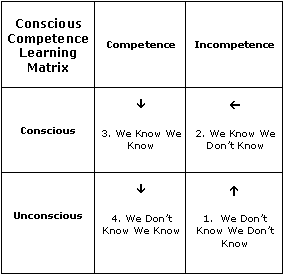We can learn from politicians. Controversial, I know, but an already infamous statement from US Defence Secretary Donald Rumsfeld reveals a valuable insight into learning – vital knowledge for effective managers. Let’s see what Donald has to say about ‘conscious competence and the learning matrix’.
Here’s what Donald said: “There are known knowns. These are things we know that we know. There are known unknowns. That is to say, there are things that we know we don’t know. But there are also unknown unknowns. There are things we don’t know we don’t know.”
What is he talking about?
Let me translate. He knows what he knows, he knows what he doesn’t know, and there are some things he doesn’t know he doesn’t know.
Did that make it clearer?
No? Fair enough – it took me several attempts too. What I mean is that when we go on a learning journey from incompetence to competence, there are 4 key stages we go through.
As a manager it’s important to recognise these stages and change your approach accordingly. Knowing about how you learn can improve your learning ability, help you stick at it when your confidence is low and improve your skills more efficiently.
The Sunday name for this model is the ‘Conscious Competence Learning Matrix‘ and the stages are shown in the diagram.
Conscious Competence Learning Matrix

(You’ll have spotted Donald didn’t know about stage 4! :>)
From one finger to 100 words per minute
Remember when you plodded around a keyboard using one or two fingers? Frustrated with the time to write a simple email, you progressed to using more fingers, maybe be taking a class or online tutorial.
You make plenty of mistakes (but that’s what spell check is for right?) but eventually you can type freely, only looking at the screen, never at your fingers. And then your boss takes your Qwerty keyboard and replaces it with a keyboard with a radical new layout, and you’re back to stage 1.
This learning journey perfectly illustrates the Conscious Competence Learning Matrix and the 4 key stages.
Let me explain…
Stage 1 – We Don’t Know We Don’t Know
Sometimes we are blissfully ignorant about the existence or relevance of a skill or behaviour, and we go about our business happy. Then a shocking thing happens. We get some feedback from a colleague or friend telling us we are lousy at something important to them. Or we’re told that business re-engineering requires us to learn some new skills fast. At this point we are painfully aware of our deficiencies and we move onto stage 2.
Manager Tip – As a manager, it’s your job to encourage feedback to make people aware of their “improvement opportunities” and kick start their learning and development journey.
Stage 2 – We Know We Don’t Know
Through fear or desire, we’re now highly motivated to improve this skill or behaviour. By “having a go” at the new skill we find out exactly how far we have to go before we are reliably proficient at this skill. If competence is a long way off, it’s important to create smaller, more achievable learning goals to maintain enthusiasm and energy.
If we’re lucky, we have a light bulb moment when all becomes clear and this enlightenment allows us to move onto stage 3. However it’s usually only through education, training and practise that we build competence in the new skill or behaviour.
Manager Tip – Be aware of the confidence crisis the learner may be experiencing, and expedite the transition from stage 2 to stage 3. This can be done by creating a safe learning environment, with plenty of opportunities to test new skills.
Stage 3 – We Know We Know
We can now reliably do the new skill or behaviour, but we’re consciously aware we’re doing it and still have to make a mental effort. We can teach someone else but will probably feel awkward, clumsy or make mistakes whilst doing so. The more we practice, the more automatic the behaviour becomes and slips unnoticed into our second nature.
Manger Tip – It’s useful to consolidate learning at this point, so consider teaching or presenting back to your team about your new found skill.
Stage 4 – We Don’t Know We Know
Eventually skills and behaviours become instinctive and competently performed with no thought whatsoever. It’s so effortless to do this once difficult task we no longer notice we’re doing it. It may become so deeply embedded it becomes difficult to explain exactly how to do it.
Manager Tip – You can keep on top of your learning by creating your own personal development plan, and regularly reviewing your progress.
So learn from Donald, and use the Conscious Competence Learning Matrix to chart your way through your personal development and learning journeys, and get from Incompetence to Competence fast.